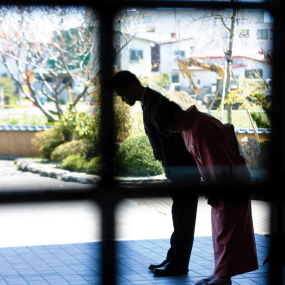ETIQUETTE

ETIQUETTE
It is often said that social interaction in Japan is more complex than that of other cultures in the West; as a foreign person however, one is not expected to be aware of all the rules and will be forgiven for social 'faux pas' that a Japanese person would undoubtedly be frowned upon for.
That said, to the Japanese, social conduct is a very important aspect of one's life and following their example (which many foreigners fail to do) would be seen as both friendly and respectful.
That said, to the Japanese, social conduct is a very important aspect of one's life and following their example (which many foreigners fail to do) would be seen as both friendly and respectful.
SHOES
 While most public buildings will allow visitors to walk in with their outdoor shoes on, it is inconceivable for one to do the same when entering someones house. There will usually be a landing just inside the front door where one can take off one's shoes and put on a pair of slippers. It is also customary to take off shoes in all schools and some restaurants.
While most public buildings will allow visitors to walk in with their outdoor shoes on, it is inconceivable for one to do the same when entering someones house. There will usually be a landing just inside the front door where one can take off one's shoes and put on a pair of slippers. It is also customary to take off shoes in all schools and some restaurants. BOWING
 From shop assistants to business associates, this is the traditional manner of greeting in Japan; The deeper the bow, the higher the status of the other party.
From shop assistants to business associates, this is the traditional manner of greeting in Japan; The deeper the bow, the higher the status of the other party.Bowing can also be a gesture used when saying 'Thank you' for something or apologising.
The average foreigner however, does not usually have to bow to offer a greeting, a simple handshake should suffice.
NOSE BLOWING
 Unlike in the UK where blowing one's nose, while not pretty, is considered a necessary evil, doing the same in Japan would be considered very rude. One is expected to sniff until the appropriate time when they can blow in private.
Unlike in the UK where blowing one's nose, while not pretty, is considered a necessary evil, doing the same in Japan would be considered very rude. One is expected to sniff until the appropriate time when they can blow in private.AT THE TABLE
 It is customary before starting a meal in Japan
to say the word 'Itadakimasu' meaning 'I receive gratefully'
and at the end to say 'Gochisousama (deshita)' meaning 'Thank
you for the meal'.
It is customary before starting a meal in Japan
to say the word 'Itadakimasu' meaning 'I receive gratefully'
and at the end to say 'Gochisousama (deshita)' meaning 'Thank
you for the meal'. Due to their symbolic role in Buddhist funerals, one must be especially careful when using chopsticks during a meal; it is an absolute taboo to pass food to someone from one set of chopsticks to another, as that is how the dead's ashes are passed on in the Buddhist ceremony.
It is also bad manners to stick chopsticks vertically into food, especially into rice (This looks bad anyway!).
With alcoholic beverages, it is customary for people to top up each others drinks. In many cases one will not even have finished their drink and it will be topped up.
GIVING AND RECIEVING GIFTS
 When giving and receiving gifts it
is important to do so with both hands to show respect. While
rejecting a present is not a good idea, protesting a little
before receiving is a useful means of expressing one's humility.
When giving and receiving gifts it
is important to do so with both hands to show respect. While
rejecting a present is not a good idea, protesting a little
before receiving is a useful means of expressing one's humility. Conversely, if one is offering the present, it shows good character to downplay what the present is.
TRAINS
 One of the ironies of Japanese etiquette is the way this culture
behaves when boarding a train. For reasons unknown, the sense
of cooperation and teamwork that permeates this nation seems
to vanish and the level of pushing and shoving that occurs would
in all likelihood end in a scuffle if it were in the West.
One of the ironies of Japanese etiquette is the way this culture
behaves when boarding a train. For reasons unknown, the sense
of cooperation and teamwork that permeates this nation seems
to vanish and the level of pushing and shoving that occurs would
in all likelihood end in a scuffle if it were in the West.The hypocrisy is clear but should be taken with a grain of salt as this culture is quaintly full of such contradictions.
